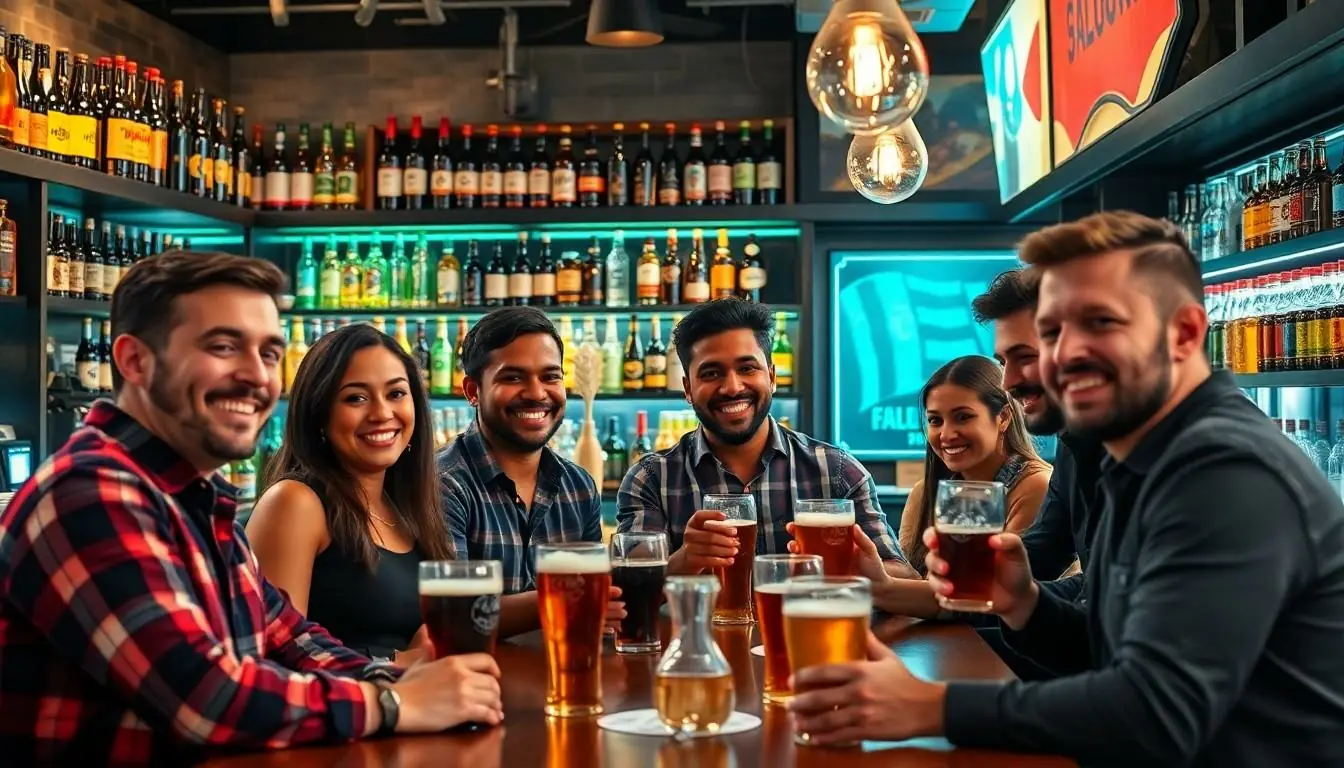In a world where technology meets tipples, fintech alcohol is shaking things up like a well-mixed cocktail. Imagine a digital bar where your favorite drinks are just a tap away, and managing your spending on spirits is as easy as swiping right. Gone are the days of fumbling for cash or losing track of that last round. It’s time to toast to innovation!
With the rise of fintech, the alcohol industry is embracing smart solutions that not only enhance the drinking experience but also make it wallet-friendly. Whether it’s apps that help you discover local breweries or platforms that let you invest in your favorite brands, the future of sipping is here. So, grab a glass and dive into the fascinating fusion of finance and fun—because who said managing your drinks can’t be a good time?
Table of Contents
ToggleOverview of Fintech Alcohol
Fintech alcohol represents a transformative shift within the beverage industry. Technology enhances the way consumers access, purchase, and enjoy alcoholic beverages. Digital solutions streamline processes, making it easier to discover new drinks and manage spending.
Platforms dedicated to fintech alcohol offer a variety of services. Mobile apps allow users to track their expenses in real-time, promoting responsible drinking habits. Many applications also provide personalized recommendations, guiding users to breweries and distilleries based on preferences.
Investors increasingly turn to fintech alcohol for opportunities. Crowdfunding platforms enable consumers to invest in emerging beverage brands, bridging the gap between investment and enjoyment. This model not only supports entrepreneurs but also creates a community focused on the shared appreciation of craft beverages.
User engagement remains a key factor in the success of these platforms. Social features often facilitate connections among enthusiasts, fostering discussions about favorite drinks and sharing tasting experiences. Gamification elements encourage users to explore new products, enhancing the overall experience.
Innovative payment solutions also play a significant role. Digital wallets and contactless payment options simplify transactions, making it convenient for consumers to purchase their preferred beverages. These advancements in payment technology align with consumer behaviors and expectations in the digital age.
With the ongoing growth of fintech alcohol, the future looks promising. As technology continues to evolve, consumers can expect even more efficient and engaging ways to enjoy their drinks. The intersection of finance and beverages forms a vibrant landscape filled with potential.
Key Players in Fintech Alcohol

The fintech alcohol landscape features a mix of innovative startups and established companies. Both sectors are crucial in shaping how consumers engage with beverages.
Emerging Startups
Numerous emerging startups are disrupting the alcoholic beverage market. These companies often use technology to enhance user experiences. For instance, platforms like Tavour connect local breweries with customers nationwide, allowing easy access to unique craft beers. Another example is Hopsy, which offers a subscription service for home delivery of draft beer, catering to the growing demand for convenience. Startups frequently embrace social media to create a community among drinkers. Apps like Drizly make ordering alcohol from local retailers straightforward, reinforcing personalized delivery.
Established Companies
Established companies are also adapting to the fintech alcohol trend. Industry giants like Constellation Brands invest heavily in technology to optimize customer interactions. Through their innovations, they streamline purchasing and enhance brand engagement. An example includes Diageo’s “Reserve Bar,” an online platform connecting consumers directly with premium liquor brands. Companies recognize the importance of mobile payment solutions, enabling faster checkouts in retail and online. Furthermore, organizations like Pernod Ricard leverage data analytics to refine marketing efforts, emphasizing consumer preferences and spending habits.
Technology Behind Fintech Alcohol
Technology drives the evolution of fintech alcohol, enhancing how consumers interact with beverages and their purchasing processes. Two standout components are blockchain applications and mobile payment solutions.
Blockchain Applications
Blockchain technology enhances transparency and traceability in the alcohol supply chain. Each transaction creates an immutable record that ensures authenticity, helping customers verify the origin of their drinks. This application significantly reduces fraud, boosting consumer confidence in purchasing premium products. Significantly, it allows for tokenization of assets, offering investors fractional ownership in popular beverage brands. Blockchain’s decentralized nature creates trust among consumers and producers alike, fostering a sense of community in the craft beverage market. Data-driven insights based on blockchain technology enable companies to tailor offerings to meet consumer preferences effectively.
Mobile Payment Solutions
Mobile payment solutions revolutionize how consumers transact in the alcohol sector. Users prefer seamless and secure transactions through digital wallets and contactless systems. Convenience drives consumer choices, allowing them to order directly from local breweries or distilleries at the tap of a finger. Integration with loyalty programs provides personalized offers, enhancing customer engagement. Enhanced security measures protect sensitive financial information, leading to increased trust from users. Additionally, adoption of these payment solutions aligns with modern shopping habits, creating an efficient way to manage purchases while enjoying favorite beverages.
Market Trends and Analysis
The interplay between fintech and the alcohol industry reveals dynamic trends shaping consumer engagement and market opportunities. Examining growth projections and consumer behavior insights highlights this evolving landscape.
Growth Projections
The fintech alcohol market is positioned for substantial growth, with estimates indicating a 27% CAGR from 2023 to 2028. Investment in technology by beverage brands drives this rapid expansion. Crowdfunding efforts continually attract enthusiasts, creating a robust ecosystem. Notable partnerships between fintech companies and established alcohol brands further support growth. Emerging startups are also capturing market share with innovative solutions. Analysts predict that user demand for personalized experiences will fuel market evolution.
Consumer Behavior Insights
Understanding consumer behavior unveils valuable insights into preferences and spending habits. Data reveals that 59% of consumers seek convenient purchasing options, making mobile apps crucial. The desire for personalized recommendations drives engagement with fintech alcohol platforms. Gamification elements in apps increase user interaction, enhancing the overall experience. Furthermore, trends show that younger demographics prioritize sustainability, leading to an uptick in local, craft beverages. Loyalty programs significantly impact purchasing decisions, increasing repeat transactions. Overall, consumer emphasis on technology and personalization shapes the future of the alcohol market.
Regulatory Challenges
Fintech alcohol faces numerous regulatory challenges that impact its growth. Different jurisdictions impose varying laws regarding the sale and distribution of alcoholic beverages. For instance, state-level regulations often dictate how alcohol can be sold online, leading to compliance complexities. Such variations can hinder the seamless operations of fintech solutions across different regions.
Licensing requirements also create significant barriers for startups and established companies alike. Obtaining the necessary permits for selling alcohol online may involve lengthy application processes and substantial fees. Even industry giants must navigate these regulatory landscapes carefully to ensure compliance while pursuing innovation.
Taxation presents another layer of complexity. Alcohol tax rates fluctuate from state to state, which can significantly affect pricing strategies. Consequently, fintech platforms that aim to offer competitive pricing must stay informed about local tax laws and adjust their models accordingly.
Advertising restrictions further complicate market entry for new fintech alcohol ventures. Marketing alcoholic beverages online can involve strict guidelines aimed at preventing access by minors. Innovative marketing strategies must comply with these regulations while ensuring engaging content for consumers.
Distilling regulatory insights is crucial for fintech alcohol companies aiming to thrive. Compliance with federal, state, and local laws remains a necessity. Managing these regulatory challenges effectively can enhance credibility and consumer trust, ultimately fostering growth in this evolving market.
The rise of fintech alcohol is reshaping how consumers interact with the beverage industry. By leveraging technology, users can enjoy a more personalized and efficient drinking experience. As mobile apps and innovative payment solutions gain traction, they not only enhance convenience but also promote responsible consumption.
Investors are recognizing the potential in this sector, driving growth through crowdfunding and community engagement. While regulatory challenges remain, the adaptability of fintech alcohol companies positions them well for future success. The combination of technology and consumer demand is set to create an exciting landscape for both enthusiasts and investors alike.





